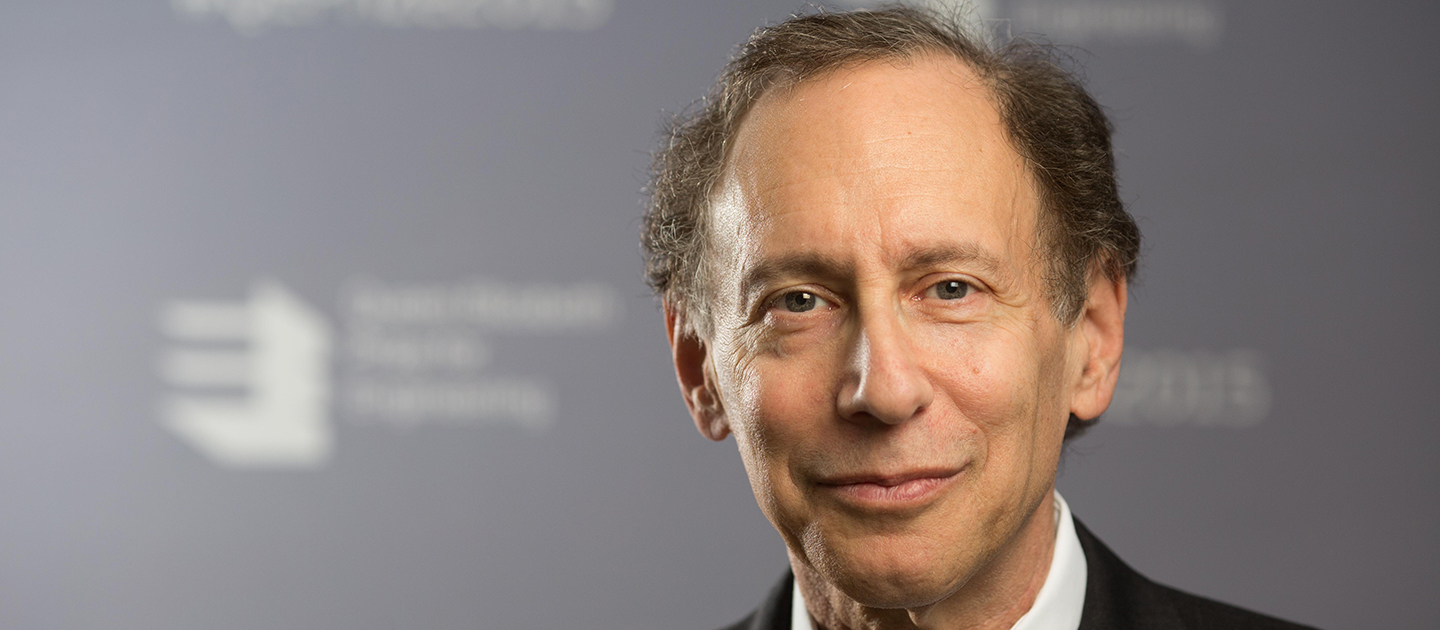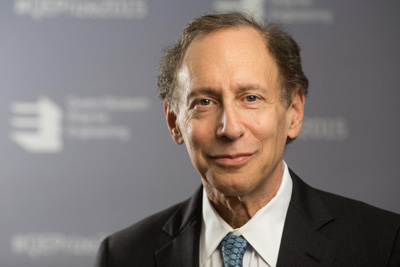 Events
EventsModerna Cofounder Robert Langer Recalls “Inauspicious” Beginning to Distinguished Career
Langer spoke at the 2022 Elsevier Distinguished Lecture on April 18

Even Robert Langer has experienced rejection and doubters. But as Langer’s story repeatedly shows, a good idea will eventually be recognized.
During the 2022 Elsevier Distinguished Lecture on April 18 hosted by Northwestern Engineering and the Department of Mechanical Engineering, Langer recounted the fits and starts he experienced when he began his career. Now an Institute Professor at the Massachusetts Institute of Technology (MIT) and cofounder of Moderna, Langer (who earned a 2006 honorary degree from Northwestern University) discussed his early research and how it led to new drug delivery technologies that are now being used to treat illnesses such as cancer and COVID-19.
“Bob Langer should be seen as a model, someone who never gave up, and an inspiration for those who struggle to introduce new ideas,” said Northwestern Engineering Dean Julio M. Ottino during his introductory remarks. “If you want to be like Bob, it’s not enough to do what has not been done. What you should try to do is what everybody says cannot be done.”

After earning his chemical engineering doctor of science in 1974 from MIT, Langer was plotting his next moves. He wrote to around 40 colleges to ask about professorships, but none wrote back. Langer then considered working in medicine and contacted hospitals and medical schools to explain how his background could help, but again was stonewalled.
Eventually, Langer contacted Judah Folkman, a surgeon at Boston Children’s Hospital and professor at Harvard University who was known for hiring people with unusual backgrounds. Folkman offered Langer a position in his lab to help him prove his theories about how tumors grow and metastasize via blood vessels, which could then be used to inhibit their development.
The resulting breakthrough was the first angiogenesis inhibitor, which blocks the growth of those vessels in tumors. The next step was discovering a delivery system for the inhibitor; a macromolecule that was challenging to use because the body can break them down or block them. After several years of research, Langer coated the macromolecule in a polymer, making it resistant to the body’s systems.
During that process, Langer encountered resistance when he applied for grants to support his work, and his first nine applications were turned down. Most doubted that Langer would be able to accomplish his goals. Langer again applied for assistant professorships and the result was the same before he landed back at MIT. There, he encountered more resistance after the person who hired him to the Department of Nutrition and Food Science, Nevin Scrimshaw, left the university.
“I had a very inauspicious beginning with failures and rejections,” Langer said. “Nonetheless, I believed in what we were doing. I could see some of the results with my own eyes. We wanted to solve the angiogenesis problem, and we did because we had the delivery systems.”
That breakthrough was the underpinning of much of drug delivery research, and propelled Langer onto one of medical science’s most distinguished careers.
The winner of more than 220 awards, Langer has written more than 1,500 articles, which have been cited more than 363,000 times. His h-index, a measurement an author’s scholarly output and performance, of 299 is the highest of any engineer in history and the third highest of any individual in any field. His patents, which number more than 1,400, have been licensed or sublicensed to more than 400 companies. He is a cofounder of a number of companies, and served as chairman of the FDA’s Science Board from 1999-2002.
Langer is also proud that Guillermo Ameer, Daniel Hale Williams Professor of Biomedical Engineering in the McCormick School of Engineering and a professor of surgery in Northwestern’s Feinberg School of Medicine, earned his PhD under his guidance.
On the frontlines of vaccine development
With Moderna, Langer played a key role in the development of their COVID-19 vaccine, which built off his previous research on drug delivery. Moderna, Langer said, had nine vaccines in clinical trials before the pandemic and built a large manufacturing plant for a cancer vaccine, and was positioned to pivot when needed.
I had a very inauspicious beginning with failures and rejections. Nonetheless, I believed in what we were doing. I could see some of the results with my own eyes. We wanted to solve the angiogenesis problem, and we did because we had the delivery systems. Institute Professor at MIT
By May 2020, Moderna’s vaccine was in clinical trials. Yet again, there were doubts about Langer and his ideas, including a Boston Globe piece with the headline “’This is not how you do science’: Cambridge biotech Moderna’s potential COVID-19 vaccine stirs hope – and criticism” that included a photo of Langer.
“I wasn’t really excited about that,” Langer quipped. “That’s what happens.”
Six months later, Moderna’s treatment went through a Phase 3 FDA trial with 30,000 patients, with 15,000 getting a placebo and the other half getting the vaccine. Not a single person who got the treatment died or was hospitalized. And per a February 2022 Mayo Clinic study, the Moderna vaccine is 94 percent effective, more effective than any other vaccine in the world.
“That’s where it is today,” Langer said. “We’re doing lots of manufacturing to try to get (the vaccine) to people in the developing world, also vaccines being developed against some of the variants are in clinical trials, and combination vaccines with the flu and RSV and COVID are also being developed.”